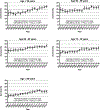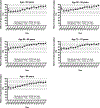Age-dependent trends in survival after adult in-hospital cardiac arrest
- PMID: 32246986
- PMCID: PMC7377193
- DOI: 10.1016/j.resuscitation.2020.03.008
Age-dependent trends in survival after adult in-hospital cardiac arrest
Abstract
Background: While survival after in-hospital cardiac arrest (IHCA) has improved in recent years, it remains unknown whether this trend primarily applies to younger IHCA victims. The aim of this study was to assess trends in survival to hospital discharge after adult IHCA across age groups from 2000 to 2016.
Methods: This is an observational study of IHCA patients included in the Get With The Guidelines®-Resuscitation registry between 2000 and 2016. The primary outcome was survival to hospital discharge. Patients were stratified into five age groups: <50 years, 50-59 years, 60-69 years, 70-79 years, and ≥80 years. Generalized linear regression was used to obtain absolute survival rates over time.
Results: A total of 234,767 IHCA patients were included. The absolute increase in survival per calendar year was 0.8% (95% CI 0.7-1.0%, p < 0.001) for patients younger than 50 years, 0.6% (95% CI 0.4-0.7%, p < 0.001) for patients between 50 and 59 years, 0.5% (95% CI 0.4-0.6%, p < 0.001) for patients between 60 and 69 years, 0.5% (95% CI 0.4-0.6%, p < 0.001) for patients between 70 and 79 years, and 0.5% (95% CI 0.4-0.6%, p < 0.001) for patients older than 80 years. We observed a significant interaction between calendar year and age group (p < 0.001), indicating that the rate of improvement in survival over time was significantly different between age groups.
Conclusions: For patients with IHCA, rates of survival to discharge have improved significantly from 2000 to 2016 across all age groups.
Keywords: Age; In-hospital cardiac arrest; Survival.
Copyright © 2020 Elsevier B.V. All rights reserved.
Conflict of interest statement
Conflict of interest statement
The authors declare that they have no conflicts of interest in relation to this manuscript.
Figures



Comment in
-
Age matters for cardiac arrests? No meaningful interpretation of results is possible without understanding context.Resuscitation. 2020 Jun;151:211-212. doi: 10.1016/j.resuscitation.2020.04.012. Epub 2020 Apr 15. Resuscitation. 2020. PMID: 32304803 No abstract available.
References
-
- Holmberg MJ, Ross C, Chan PS, et al. Incidence of adult in-hospital cardiac arrest in the United States. American Heart Association Resuscitation Science Symposium, American Heart Association Resuscitation Science Symposium; 2018 Nov 10–12; Chicago, Illinois Circulation 2018 Abstract No. 23: n.d.
-
- Martin GS, Mannino DM, Moss M. The effect of age on the development and outcome of adult sepsis*. Crit Care Med 2006;34:15–21, doii 10.1097/01.CCM.0000194535.82812.BA. - DOI - PubMed
-
- Mosenthal AC, Lavery RF, Addis M, et al. Isolated traumatic brain injury: age is an independent predictor of mortality and early outcome. J Trauma 2002;52:907–11. - PubMed
Publication types
MeSH terms
Grants and funding
LinkOut - more resources
Full Text Sources
Medical

